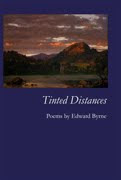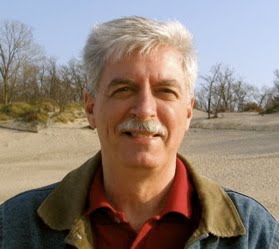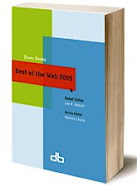 During the last year, I have returned to read Brian Turner’s Here, Bullet a number of times. As stark scenes of violence continue in television news clips and on the covers of news magazines, I have found myself repeatedly seeking this poet-soldier’s images, written in concise lines of poetry that at times appear intimate, yet often also maintain an ability to present a bit more of the differing perspectives of other Americans or Iraqis ensnared by the circumstances of combat and survival, poems of personal considerations and experiences that somehow strike a widespread interest and have assumed a greater public significance.
During the last year, I have returned to read Brian Turner’s Here, Bullet a number of times. As stark scenes of violence continue in television news clips and on the covers of news magazines, I have found myself repeatedly seeking this poet-soldier’s images, written in concise lines of poetry that at times appear intimate, yet often also maintain an ability to present a bit more of the differing perspectives of other Americans or Iraqis ensnared by the circumstances of combat and survival, poems of personal considerations and experiences that somehow strike a widespread interest and have assumed a greater public significance.Turner, who served seven years in the U.S. Army, including tours of duty in Bosnia-Herzegovina and then Iraq, is also an MFA graduate from the University of Oregon’s creative writing program. With Here, Bullet Turner follows in the footsteps of other American writers who have eloquently recorded emotionally charged front-line observations during a time of war. Indeed, Walt Whitman, Ernest Hemingway, and Tim O’Brien seem among the primary influences on Turner (the Vietnam War poems of Bruce Weigl and Yusef Komunyakaa may also play a part). In interviews Turner has acknowledged a debt to O’Brien’s works (especially Going After Cacciato), and like O’Brien in his fiction, this poet often focuses on details that lend a persuasive sense of authenticity or authority to the voice in the poems, even when pieces involve fanciful scenes or surreal dream-like narratives.
Recognition of Hemingway’s influence appears early in the book as a quote from Papa opens the initial poem: “This is a strange new kind of war where you learn just as much as you are able to believe.” Throughout the poetry in Here, Bullet Turner displays his attempts at understanding the conditions in which he, his fellow soldiers, and the Iraqi citizens must endure day after day in order to survive. He wants to believe the terrible sacrifice of lives will be worth it in the end; however, by the final poem in this volume readers will witness indications Turner has lost all hope the cost of the war will be warranted, let alone rewarded by a better future. Like the wounded Harold Krebs in Hemingway’s “Soldier’s Home,” who comes back from combat and reads books about his battlefront, seeing in them a different war than the one he experienced, Turner’s speaker in “Ferris Wheel” comments: “The history books will get it wrong.” Nevertheless, one of the most important characteristics of this volume remains Turner’s almost complete avoidance of any overtly political commentary or editorializing, reserving his sole focus for the presentation of powerful actions and clearly depicted individuals, allowing readers, if they wish, to form their own opinions on political concerns or controversial issues.
Admirably, Turner tries to offer different versions and to identify differing visions of the events related throughout the book by learning various aspects of local language, customs, and religious beliefs. The speaker in these poems desires a way to understand and empathize with those whose country is caught in the crossfire of conflict. In recent comments, Turner has voiced great admiration for the writings of John Balaban, particularly Remembering Heaven’s Face, a memoir about his relationships with the Vietnamese people he met—learning their language, literature, and culture—during a time in which he volunteered to work in the war zone even though he’d been granted conscientious objector status. Readers can appreciate Turner’s compliment to Balaban just as they also may appreciate the complementary elements in each author’s approach to the subjects in their writings.
Some of the poems in this book seem like contemporary camp scenes reminiscent of the Civil War campfire poems by Walt Whitman, as soldier's are portrayed in ordinary circumstances while on base or enjoying a lull after curfew. In “Cole’s Guitar” Turner’s language most closely resembles Walt Whitman’s voice when he catalogs images of America evoked by the sound of a comrade’s six-string. “I’m hearing America now,” Turner writes as he lists various everyday events he imagines taking place back home. By the final lines of the poem (which is recorded as taking place in Al Ma’badi, Iraq), Turner’s speaker reveals seeing strangers’ faces “the way ghosts might visit the ones they love, / as I am now, listening to America….”
Although, as with almost all first books of poetry (one could say all books of poetry), there are a handful of poems that clearly stand as the strongest in this collection, a number of compelling poems draw the reader from the opening piece introduced by the Hemingway quote through to the closing work in the book. However, one poem in Here, Bullet deserves to be identified not only as an outstanding work in this volume, but also as one of the finer pieces by any poet in recent years. “2000 lbs.” is a poem that freezes in time the moment a terrorist suicide bomber triggers his explosives in a town square of Mosul. In sectioned passages of the poem, Turner provides readers with brief profiles introducing some of the victims in the blast—what they are doing, what pasts they have experienced, whom they love and by whom they are loved, what hopes for the future they hold, where they are headed—when their lives are suddenly and shockingly destroyed.
Among the victims arbitrarily targeted are American soldiers, as well as Iraqi men and women, including one old woman who “cradles her grandson, / whispering, rocking him on her knees / as though singing him to sleep.” Consequently, in addition to fixing in time an isolated moment of horror in the center of a war zone, Turner also aptly captures an iconic act emblematic of an entire period of history. Few poems show such potential for moving readers so emotionally while at the same time inviting intellectual and ethical reflection, requesting that readers investigate the tenuous thread by which any life hangs. Considering the state of ongoing world tensions, I know I surely will be returning to this collection of poems again and again with similar unanswered questions to those raised by the speaker of “Night in Blue”: “What do I know / of redemption or sacrifice, what will I have / to say of the dead—that it was worth it, / that any of it made sense?”
Turner, Brian. Here, Bullet. Alice James Books, 2005.























No comments:
Post a Comment